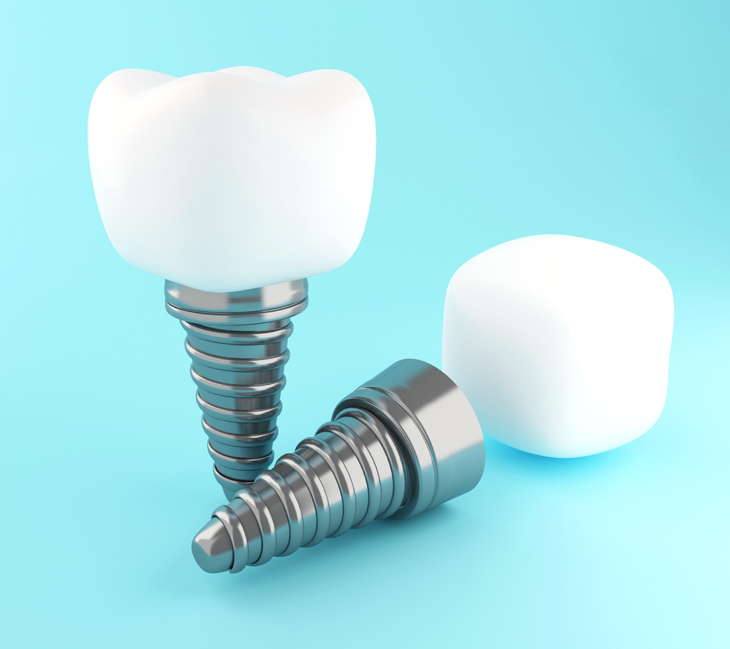
What Are Mini Dental Implants?
Mini dental implants are smaller than traditional dental implants. They typically range in diameter from 2 mm to 3.5 mm, while traditional dental implants range from 3.5mm to 6mm in diameter.
The smaller size allows for a more conservative approach to implant placement, particularly in areas of the jawbone where there may be limited bone density. Most times, mini dental implants can be placed with minimal or no bone grafting, saving patients time, money, and additional procedures when compared to regular dental implants.
A mini dental implant is made of the same materials as traditional dental implants, such as titanium or zirconia. Their design mimics the structure and function of natural tooth roots, providing a stable foundation for dental appliances such as single dental crowns, bridges, or dentures.
If you’re wondering how mini dental implants can benefit you, contact our Prairie Village dentist today by calling (913) 362-4488 to schedule an appointment.
Mini Dental Implant Benefits
- Mini dental implants don’t require as much jawbone density as regular dental implants, making them a good option for individuals who have experienced bone loss due to periodontal disease or other factors. This eliminates the need for bone grafting.
- It’s a minimally invasive procedure compared to traditional dental implants. Patients also experience shorter healing times.
- Mini implants are typically less expensive than other tooth replacement options.
- Mini dental implants can mimic the structure and function of tooth roots, providing a natural look, feel, and function.
- They often provide a better fit as they’re known as toothpick-sized implants.
- A permanent solution to tooth loss.
Mini Dental Implant Cons
- Limited support: Since mini implants are smaller in diameter, they may not provide as much support for larger dental appliances. They’re often recommended for a single-tooth replacement.
- Long-term durability: While made of strong, durable materials, mini implants don’t have the same long-term durability as traditional implants.
- Higher failure rate: Some studies have shown that the mini dental implant failure rate is higher than other implant treatments. However, the failure rate varies with the type of implant, the surgical technique, and post-operative maintenance.
- Potential for complications: As with any surgical procedure, there’s a risk of complications associated with placing a mini implant. These risks can include infection, nerve damage, and implant failure.
- Cost: While mini implants tend to be less expensive than traditional implants, the cost can still be significant, and some dental insurance may not cover the expenses.
Mini Dental Implant Process
- Consultation: You’ll begin with an initial appointment with our dentist. They’ll evaluate your oral health, discuss your dental history, and help you decide if mini dental implants are the best option for your oral health needs.
- Placement: On the day of your procedure, you’ll receive a local anesthetic or another form of sedation to ensure a comfortable surgery. Then, implant posts will be surgically placed into the jaw through a small hole accessed through the gums. While mini implants require less invasive techniques, you’ll need to set time aside for recovery.
- Recovery: It will take time for the posts to naturally fuse with your jaw. During this time, make sure to follow any instructions given to you by your dentist.
- Placing Your Restoration: Once you’ve fully recovered, you’ll schedule an appointment to have your choice of restoration placed. After that’s placed, you’ll have a beautiful, complete smile.
Candidacy for Mini Dental Implants
- Individuals with low bone density: Mini dental implants have a smaller diameter compared to traditional implants, meaning they don’t require as much bone density for support. This makes them an ideal option for patients who have experienced bone loss because of periodontal disease or other health problems.
- For those who have lost one or more teeth: Mini dental implants can support a single dental crown or bridge or even stabilize a removable dental appliance such as a denture.
- Patients with removable dental appliances: Mini dental implants can be used to stabilize a removable dental appliance, such as a denture. They can provide a more secure fit and prevent the appliance from moving around in the mouth.
- Those who prefer a less invasive option: The placement procedure is typically less invasive than traditional dental implant placement. This can be beneficial for patients who prefer a less invasive option or have medical conditions that make traditional implant placement more complicated.

